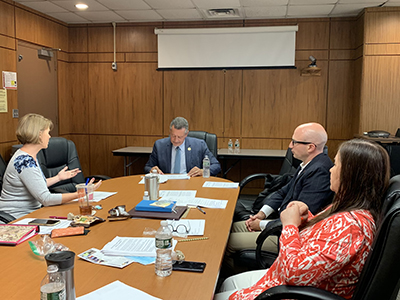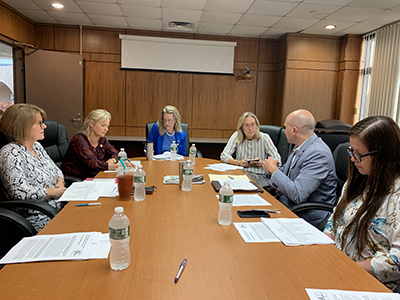Courtney Brewer
In July, the FA's political action committee met to screen legislative candidates, as we do each year. This year, however, we decided to depart from our standard format of questioning candidates about their legislative priorities, and instead presented them with a packet of information that we feel they need to be aware of. The college has been not only sustaining but expanding a large and complex administrative structure, often supporting duplication and triplication of positions across the campuses and creating new administrative positions with each new initiative—all while faculty lines have gone unfilled following record numbers of retirements (which administration refers to as "savings by attrition") and while student enrollment has steadily declined. This pattern has been in place for the past ten years and is not new, but it has become more and more unsustainable and must end. Anyone attempting to untangle the 11-page administrative organizational chart can see how each campus has built its own administrative silo, all while the college-wide administrative structure has also grown. This practice has continued while the number of classroom faculty in particular has shrunk, and a college administrator openly stated during a 2020 Suffolk County Legislature meeting that it intends to rely on adjunct faculty to manage their budget.
Transforming lives is a full-time job These trends are simply contrary to the overall mission of the college and our obligation to our students. The SCCC vision statement reads
Playing a direct role in the transformation of students’ lives is what our faculty live to do, and what we indeed accomplish in sometimes small and sometimes very large ways. Typically, that transformation takes place not during the course of a class lecture, but in the enriching experiences and supportive interactions a student has outside of the classroom. Adjunct faculty are not able to provide the same level of support to students that full-time faculty can provide; they are required to neither hold office hours to meet with students nor to serve on committees and lead assessment efforts. They are often unable to advise clubs due to time constraints or unable to provide students with information on important resources available to them. Make no mistake: Our adjunct members bring incredible dedication, passion, experience and energy to the classroom, but are simply not in a position to take on the added dimensions of student development and enrichment outside of the classroom due to the time constraints they are often faced with as they are commuting to other campuses or other jobs, or simply heading home after a 14-hour workday. College administration may be content to fill lines with less expensive adjunct faculty, but should not pretend that students are being served by this model or that this is how we make our vision of transformation a reality for the students we serve. A department of one (or none) Administrative bloat and continued over-reliance on adjunct faculty are practices certainly not unique to SCCC; they are representative of national trends in higher education and community colleges in particular. There exists, however, extensive research demonstrating that students are better served by being able to interact with full-time faculty. All of our many administrators should be aware of these findings. They must also be aware of the academic disciplines at the college that are currently being staffed with only one full-time faculty member, or in some cases no full-time faculty, and yet the pattern of not filling full-time teaching lines and relying more and more on adjunct faculty has held year after year after year.
Retention matters It is possible, and in some cases likely depending on the academic discipline, that a student could attend SCCC for an entire academic year, or even two years, and not have a full-time faculty member assigned to any of their classes or to not be interacting with full-time nonclassroom faculty. This is especially true since an increasing share of SCCC students attends part time and not during the typical workday. Not only is this a disservice to individual students, it also impacts our enrollment and retention efforts, which is a major concern as our student population drops each year. Retention is largely a function of the experience a student has once they are here, and full-time faculty have the ability to directly impact that experience in ways that can increase retention. The best advertisement for our college is our students. Students who are not fully engaged and supported are not likely to recommend SCCC to other potential students, thus impacting enrollment. In addition to student development, our full-time faculty are called upon regularly to lead important assessment efforts and inform academic policy by volunteering for academic and governance committees. This work becomes ever more taxing for those disciplines and departments with one full-time faculty member, and downright impossible when there are none. It falls to the wayside not because it is unimportant or faculty are uninterested, but because there is simply no one to do it. In addition, active learning and experiential courses such as those involving internships or independent study experiences end up being cut from the schedule because full-time faculty are stretched too thin. Seeking positive change for our students, for our college Why share this information with our county legislators? We feel it is important that questions be asked of the administration regarding their commitment to the academic mission of our college and where they are allocating resources. The county legislature votes on the college budget each year, and our elected officials should be confident that the college is dedicating adequate resources to the education and development of our students. Our college and our graduates play an important role in the overall economic and social health of Suffolk County. Who else needs to receive this message? The college’s Board of Trustees. Their more direct oversight of the college budget should include questions about how resources are being distributed and, most importantly, about how students are being served. The FA will be presenting members of the Board of Trustees with the same information we shared with our legislative candidates. We are steadfastly committed to our efforts to raise awareness of these issues and will continue to press administration to change the long-standing patterns that we know are negatively impacting our students, our members and—most critically—the future of our college. |

